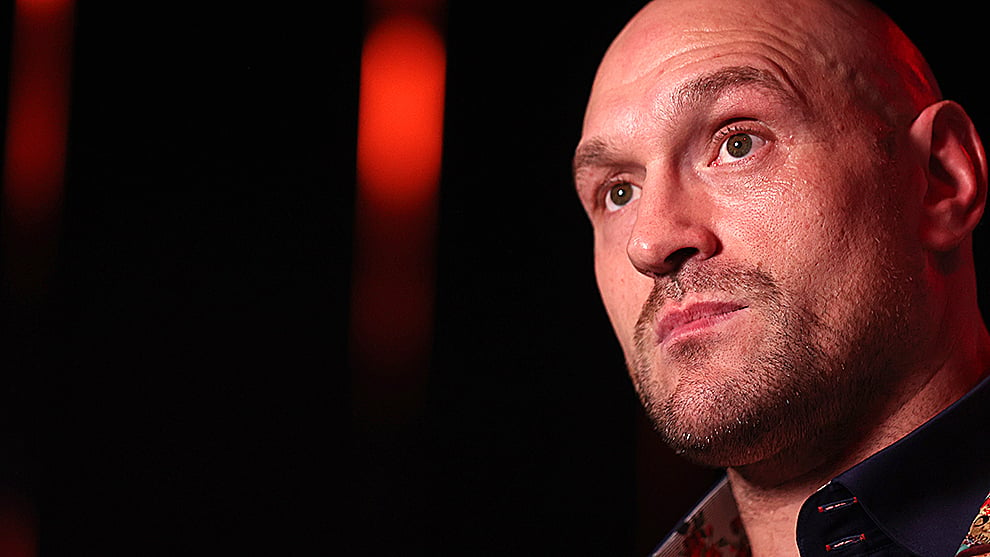By Matt Christie
TYSON FURY last week endured a cut above his right eye in sparring that resulted in 11 stitches and the postponement of his February 17 showdown with Oleksandr Usyk. The Ukrainian and his team were not amused and neither it seemed were an awful lot of Fury’s own fans.
There is no evidence to suggest it was anything other than an unfortunate accident yet Fury – the self-proclaimed ‘fighting man’ – found himself being accused of all sorts. Some even suggested Fury was so scared of Usyk he’d torn a hole in his own face and forfeited hundreds of millions of pounds in the process.
The news of Fury’s injury came as unsubstantiated rumours were gathering pace that Tyson was struggling in camp. At 35 years old and fresh off a dreadful showing against Francis Ngannou the years of bad living had supposedly caught up with him. ‘He’s looking for a way out,’ certain folk hollered. ‘His sparring has been a disaster!’ Then came the cut eyelid and Fury found himself at the bottom of a hill with social media snowballing towards him.
Tyson Fury’s cut
Fury is arguably the most divisive character in boxing these days. Plenty have grown tired of his schtick on social media. Those who advise him will tell you privately they wish he’d stay off it, at least until after the fighting is done. Now, the years of insults and swearing and shouting are coming back to haunt him. People remember how he reacted when David Haye pulled out of projected dates with Tyson – on one occasion with a cut eye – a decade ago. They remember him withdrawing from the Wladimir Klitschko rematch three years later. They remember his promises and his failure to keep all of them. Social media is cruel like that. Life moves on, circumstances and perspectives change, but what is said on social media is indelible for as long as you choose to embrace such fickle surrounds. There’s more than one lesson to learn from that.
Truth is, Fury has every right to postpone the fight. He’d be a fool to do anything else. Usyk has every right to be annoyed too, just like Fury was when Haye pulled out. Most importantly, the contest has hastily been rescheduled to May 18, a delay that might only prove a footnote in history, much like what occurred when George Foreman suffered a cut that pushed back his contest with Muhammad Ali in 1974.
We hope that’s the case. We hope that Fury now disappears and dedicates himself to the biggest fight of his life. Beating Usyk convincingly is now the only way to get back at critics. He doesn’t need to show anyone what his torso looks like. He doesn’t need to say the cut is a bad one. He doesn’t need to badmouth his opponent. He doesn’t need to look at social media and conclude that the world is against him. He doesn’t need to prove anything between now and May 18, at least not to anyone but himself.
Three short months, that’s it. Once that time has passed, Tyson Fury will have the chance – we hope – to make the kind of statement that matters in the real world. For Tyson Fury, however, three short months can prove an awfully long time.
Oleksandr Usyk
THE death of Japanese boxer Kazuki Anaguchi on February 3 was the real tragedy of last week. He suffered a subdural hematoma on December 26, when he was dropped four times before losing a 10-round decision to Seiya Tsutsumi in Tokyo.
He could be seen struggling to stand in the moments after that contest. He lost consciousness and would never regain it. He leaves behind a young family, including a one-year-old daughter.
It was a horrific and rare accident, but it should not be distanced from the sport that caused it. Anaguchi was 23 years old and no doubt felt invincible heading into the contest. His fate should remind all of us about the danger that lurks in every bout.
HAS there ever been a more impressive fictional boxer than Apollo Creed? The way he used to glide in and out, the power he could manifest with his jab, the stunning physique, the much-copied attire, his gutsiness inside the ring and his effortless charisma outside of it.
For me, Creed was better than anyone else in the Rocky franchise. Plenty of a certain age will point to Creed and his nemesis Rocky Balboa as their gateway into the sport.
Those who say it was merely a work of fiction are missing the point. Alongside Sylvester Stallone, Carl Weathers crafted one of the most enduring and influential of all rivalries. Weathers, who brought Creed to life, died at the age of 79 last week.
He will be missed. He will also live on, as Apollo Creed, for many years to come.
